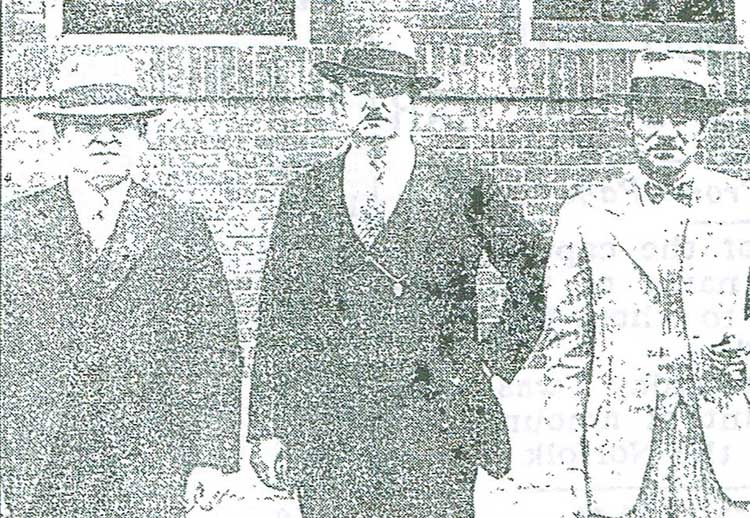Historical Reminiscing with Robert B. Hitchings
When A Norfolk Man Stopped Capone!
Copyright. All rights reserved.On a cold night in March, 26, 1928, a mysterious train was stopped in Berkley section of Norfolk. Inside the box car was labeled 300 barrels of sweet potatoes shipped from a small town called, Havelock, North Carolina.
A "hot-tip" phone call, came into Norfolk’s Police department which was directed to Officer W. Carl Spencer, (1896 -1978) a homicide detective at the time. An unknown man told Spencer that a freight car with a cargo of booze, labeled sweet potatoes, was en-route from Chicago and was headed to Norfolk. The hot-tipper gave the box car number and when the time the train was leaving New Bern, N.C. Inside this box car was thousands of gallons of booze.
This was the prohibitionist era (1920-1933) when it was illegal to buy whiskey in the United States. It was a nationwide, constitutional ban on the production, transportation, and sale of any type of alcohol beverages. This was the law of our land!
In talking to Sidney Ironmonger, Norfolk’s Police Chief, (1859-1935) about this strange phone call, Spencer was able to obtain a search warrant for the freight car.
When Spencer and his partner Detective Bill T. Walker (1897-1971) were able to intercept the train south of Norfolk, they saw two men sitting on top of the boxcar. As the train began to slow down these two men quickly got off and disappeared. The detectives served the warrant and broke open the seals of the car. At first, they only saw barrels of sweet potatoes. Spencer pulled the barrels aside and noticed the rest of the boxcar was full of barrels of liquor, booze galore!
Federal agents were called in and the box car of booze was valued at $100,000, a hefty sum in 1928. Inside the boxcar were 34 barrels of Kentucky whiskey, 25 barrels of scotch, and 100 cases of good French brandy. For several days this was big news here in our Tidewater area.
That same day Carl Spencer received a phone call from a man with an accent who wanted to talk about this whiskey. Spencer, not going alone, took Detective Dan Weisbard (1896-1928) along. They met at the old Lorraine Hotel (long gone) in downtown Norfolk. As Spencer recalled years later, “They were good looking young men, well dressed, and each one was wearing an empty shoulder holster. No guns were present.” In their conversation Spencer was told that the whiskey belonged to a multimillion-dollar syndicate out of Chicago. These men were not really interested in the whiskey itself, but the man who tipped them off?
In the conversation Spencer and Weisbrod were asked, “Do you boys smoke? There are some fine cigars on the dresser along with pieces of paper to light them." Those pieces of paper were $100.00 bills.
As Spencer said, “I told them I could not help them and warned them every time they tried to move whiskey through here, we would get to it.”
The federal authorizes kept up the investigation. They found out that consignee of the sweet potatoes was a Havelock man involved in bootlegging. There was no such company by the name of Batkistini Brothers to whom the sweet potatoes were assigned. Also, the South Water Market warehouse in Chicago where they were supposed to be delivered was an Al Capone front.
Carl Spencer always believed that seizing this boxcar of booze was a large factor that set the stage for the St. Valentine’s Day Massacre (7 men machined gunned down in a Chicago garage), between two gang leaders, Scarface Capone and Buggs Moran. The coastal route of Carolina was now closed to Capone.
Why the hot-tip? Apparently one of the skippers of a fishing boat that was transferring the booze was accused of stealing a bottle of whiskey. The Capone agent refused to pay him. This independent fisherman was not going to be pushed around by Capone’s agent. The next day he telephoned the Norfolk Police Department and asked to speak to Carl Spencer.
That simple phone call by that fisherman to Officer Spencer stopped the illegal trafficking of booze through our area of Norfolk.
Carl Spencer left the Police department in the 1940s. He lived with his family in Ocean View near Spencer Beach, went into politics, and was a fishing pier operator in his later years. When asked by Robert Ramage, a Virginian-Pilot reporter in January 1959, about his time in the police department and the seizing of the boxcar of booze in Berkley, Spencer replied, “If I had known I was tangling with the Capone gang, I wouldn't have taken just one man with me; I’d have taken half the police department.”
(l-r) Detectives W. T. Walker & Carl Spencer
with Police Chief Sidney W. Ironmonger* * * * * * * * * *
Robert B. Hitchings is a seventh generation Norfolk resident, graduating with an Associate's Degree in Biology from Old Dominion University and BA in history from Virginia Wesleyan University. During his studies he was awarded a scholarship at Emmanuel College, Cambridge, England, and he was an exchange student at Brooks-Westminster College, Oxford, England. From 1999-2014 he worked as head of the Sargeant Memorial History Room at Norfolk Public Library, and since then has headed the Wallace History Room at Chesapeake Public Library. He is also the President of the Norfolk County Historical Society, and for six years was a columnist for The Virginian-Pilot. Robert may be reached at nchs.wallaceroom@gmail.com
